| |
"Happiness creeps into you so quietly that you don't notice... but misfortune arrives very abruptly." |
| |
Fumiya muses on the cards dealt by life |
Quiff-haired and socially isolated law student Takemura Fumiya (Joe Odagiri) is in debt to a loan shark for ¥840,000, which is about £5,000 in UK money at the current exchange rate, in case you were wondering. It's a problem that receives an urgency upgrade when burly debt collector Fukuhara Aiichiro (Miura Tomokazu) walks into his apartment, stuffs a suffocating sock into his mouth, and gives him three days to pay up or face the doubtless unpleasant consequences. What's a penniless boy to do? After scaring off two cheerful schoolgirls who were seeking donations to help Afghan children by asking how much cash they have in their collection boxes, Fumiya discovers a key to a nearby station locker, inside which is the sort of bag in which movie criminals like to hide bank robbery spoils. In keeping with his current run of luck, this one contains a small collection of Daruma dolls of little financial value and a broken-off nose from a goblin statue.
The dejected Fumiya is contemplating this latest disappointment when Aiichiro reappears with a proposal that will not only cancel his debt, but net him another million yen. Having committed an initially unspecified crime,* Aiichiro has decided to hand himself in at the police headquarters in Kasumigaseki ("Might as well go to the best") and has chosen to walk there, a journey that could take anything from three days to a month, depending on how he feels and what route he elects to take. What he's looking for is a companion to keep loneliness at bay, but if Fumiya accepts then there's no backing out, however long it may take. The younger man reluctantly agrees – what choice does he really have? – and the two men begin a trek on which their early mutual antagonism is set to gradually mellow.
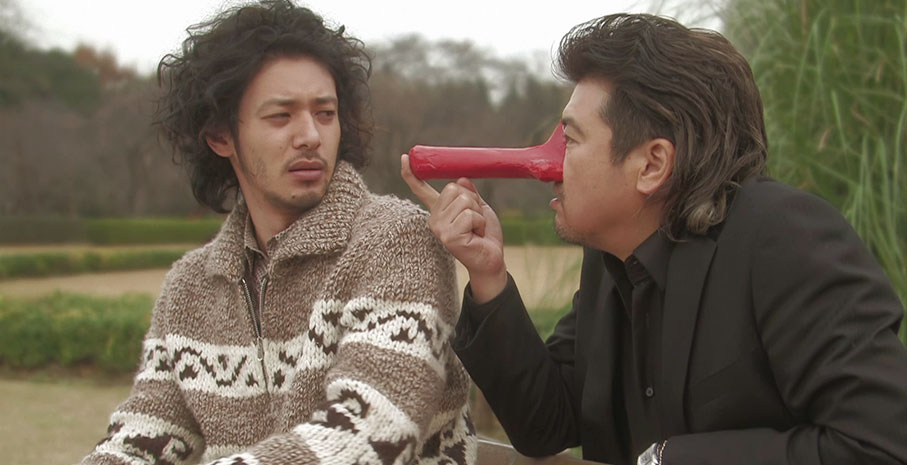
What is essentially a road movie built around the age-old concept of the mismatched pair who become friends over time is given a distinctive flavour by the nature of the journey itself – in a city as busy and diverse as Tōkyō, you're always going to see more travelling on foot than you would by car – and the offbeat collection of characters they meet during the course of their journey. Almost everyone they run into is quirky in some way, which litters their travels with memorable encounters: the female restaurant owner (Washio Machiko) who loudly argues with her bullying adult son (Ishihara Yoshizumi) and chases him into the street while the two men look on and continue their meal; the ageing clock store owner (Tsumura Takashi) who takes furious offence at Aiichiro's enquiry about the shop's viability, then chases them across town and floors Aiichiro with an elegantly executed karate kick; the older cosplay fan – "There's no age limit for cosplay!" – who dresses as the once-popular Japanese TV superhero Gekko Kamen and who may be the real deal; the "Shinjuku Mum" who runs a popular street stall offering an "expert opinion on anything"; the flamboyantly glam-dressed guitarist who walks the city streets thrashing out tunes to no-one in particular quits only when faced with two baton-tapping policemen. Even the background is peppered with memorable detail, a trait first established in a single shot title sequence walk through a lively shopping area, where the two men pass everything from overexcited schoolgirls to businessmen making phone calls whilst riding unicycles.
This whimsical approach risks pandering to the western cliché of Japanese eccentricity, one that casts the whole country as odd for daring to differ from our own culturally narrow definition of what constitutes normality. But the insider's view presented here by director Miki Satoshi (and, we can presume, source novel author Fujita Yoshinaga) displays a gentle affection for the unusual elements of everyday life, grounding even the wilder exaggerations in a reality that anyone who has spent time in Japan should recognise as authentic. Some of this is clearly specific to the locale – a discussion on a colloquial alternative word for walks, or the way female office workers hold their wallets aloft – while others will require a passing knowledge of Japanese culture to appreciate in full. But so dense is this background detail, so deft Miki's handling, and so enjoyable the performances that you'll likely still find yourself smiling and convinced that you understood every reference.
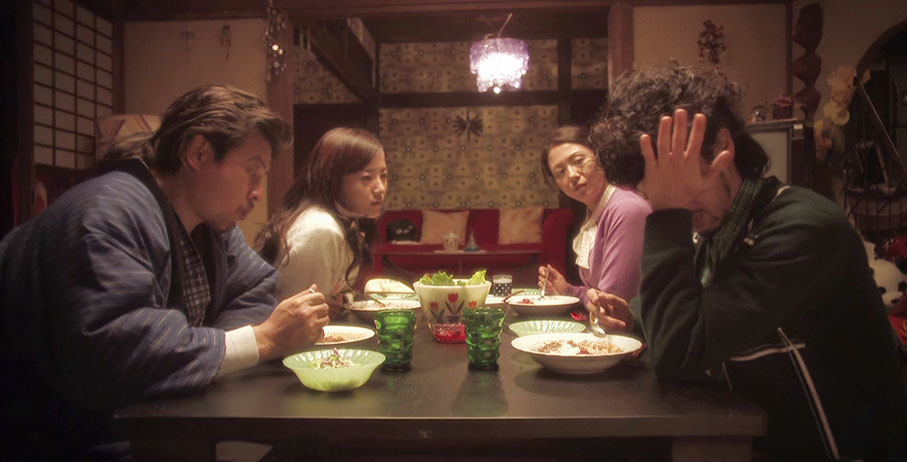
Such attention to character and background enriches and fragments the ongoing conversation between Aiichiro and Fumiya, itself an engaging blend of opinion, social observation and mutual self-discovery that is repeatedly sidetracked by the people they meet, narrative disruptions that open small windows into aspects of the lead characters' lives. There's cosplay enthusiast Naomi (Hiraiwa Kami), whom the Fumiya doted on as a child but abandoned after his attempt to make her a fake Lacoste shirt fell apart in her hands. There's the furious tatami mat salesman (Sasano Takashi), whose wife Aiichiro's father once seduced and who is still looking for payback. And there's nutball artist Kaburagi (Hirota Reona), who lives in self-imposed squalor, paints pictures of WW2 bombing raids, and glides across the ground like an earthbound spirit. Most revealing of all is Makiko (Koizumi Kyōko), who once posed as Aiichiro's wife at a wedding for which she and he were hired as fake relatives.** It's a deception that she has chosen to continue, assuring her childlike but wildly enthusiastic teenage niece Fufumi (Yoshitaka Yuriko) that Aiichiro is her real husband and that he will one day return from his work as a ship's captain. Makiko also has her eccentricities, repeatedly going back for just one last thing when leaving the house and describing Aiichiro as someone whose "anus must be missing a crease," seemingly in the belief that this is a commonly used term. It's in Makiko and Fufumi's company that the father-son relationship that has unobtrusively been developing between Aiichiro and Fumiya is brought subtly to a head, with the latter shedding quiet tears at the prospect of his friend's departure as he briefly enjoys a taste of faux-familial stability that he was denied in childhood by his real parents' absence.
There's more than a whiff of the cinema of Kitano Takeshi in Miki's approach to character and quirky comedy and the manner in which the story unfolds, the main reference point being Kitano's 1999 Kikujiro no natsu, another tale of a brash father figure and a surrogate son who gradually bond during the course of a journey peppered with offbeat encounters. But Adrift in Tōkyō [Tenten] is still every inch the work of the man who brought us the brilliantly titled and equally quirky Turtles Are Surprisingly Fast Swimmers [Kame wa igai to hayaku oyogu] in 2005, and it's every bit as confidently handled and deliciously detailed as Kitano's quietly magical film. The performances are a joy, with lead players Miura Tomokazu and Joe Odagiri bouncing off each other wonderfully and inhabiting the roles of Fumiya and Aiichiro like comfortable second skins. Strong support is provided by the energetic Koizumi Kyōko as the upbeat Makiko, a genuinely hilarious Yoshitaka Yuriko as the wildly excitable Fufumi, and an appropriately creepy turn from Reona Hirota as the oddball Kaburagi. There's even a cameo role for veteran actor Kishibe Ittoku (Zatoichi, Survive Style 5+), who gets the rare chance to play, well, veteran actor Kishibe Ittoku.
Part road movie, part buddy drama and part semi-surrealistic observational comedy, the real strength of Adrift in Tōkyō is not just that each element works as well as it does, but that they so harmoniously gel. Even a comical sub-plot involving three office workers who are repeatedly distracted from a task that unknowingly risks upsetting Aiichiro's plan feels organically melded to the main story, in part because the they as energetically daffy as anyone that Fumiya and Aiichiro encounter en route (stay with the end credits for a comical postscript to one element of their story). The result is an involving, touching, sad, frequently funny and richly textured work that remains without question one of my favourite Miki films to date.
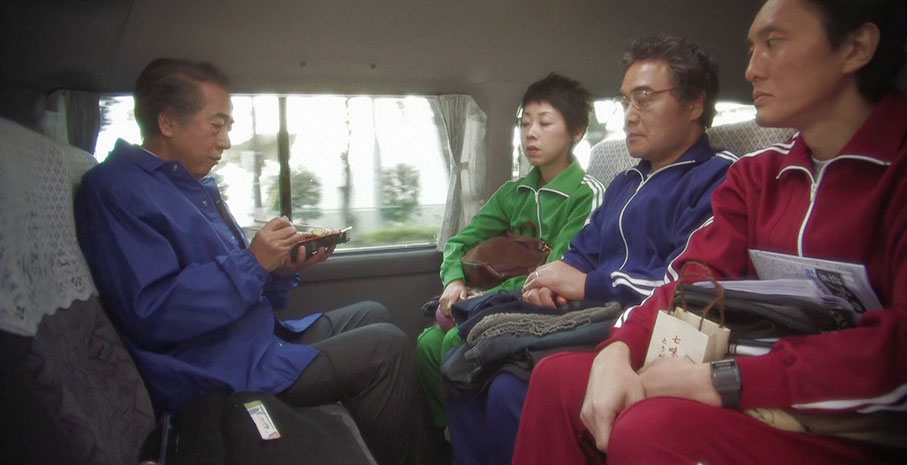
A postscript. Before I sign off, there's just one small thing that got to me on this viewing, and it does involves a spoiler, at least by the parameters I've already set up in this review. Thus, if you've not yet seen the film and know nothing of the crime that Aiichiro has committed, hop ahead to the Sound and Vision section of this review or click here to bypass the following discussion.
If you're still with me, then you probably know that the reason Aiichiro is turning himself in to the police is that he has killed his wife, having hit her in a moment of anger during an argument over her most recent infidelity, a crime for which Aiichiro believes he should pay the maximum penalty. Initially, there's a suspicion that he may be spinning a yarn, but the truth of what he claims is soon settled by a wide shot of his apartment interior, in which we can see his wife laid out on her bed. Her presumably deceased state is confirmed when her co-workers – the above-mention trio of office clerks – begin questioning but repeatedly failing to successfully investigate her unusual absence. What struck me when watching the film again after a gap of several years is how easily the journey Aiichiro takes with Fumiya distracts us from the gravity of what he has done. Intermittently, the film returns to the wide shot of the apartment interior to remind us of his wife's fate, and on this viewing I was left with a profound sadness for this poor woman, robbed of life by her husband's anger and reduced to a mere background detail in the adventures of the man responsible for her demise.
Adrift in Tōkyō was shot on HD on a Canon XL-H1, a highly regarded prosumer camcorder in its day, and while the film's digital origins are evident in the 1080p transfer on this Blu-ray, the image quality is still very pleasing. Detail is noticeably crisper and more clearly defined than on the previous DVD release (and that was no slouch), and in common with the transfer on that disc, the contrast has been gently graded, subtly softening the black levels in some sequences and favouring a warm, sometimes golden autumnal look to an otherwise naturalistic colour palette. Unsurprisingly for a digital transfer, the image is spotless, and it's framed in a slightly unusual 1.96:1 aspect ratio.
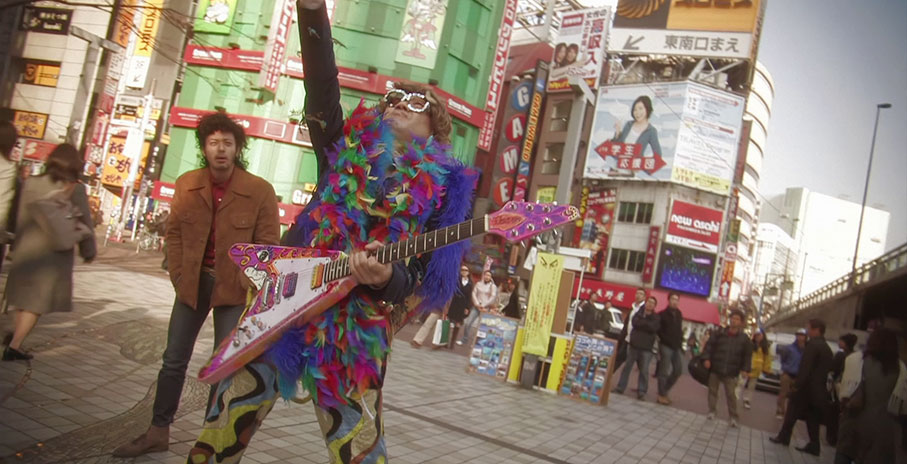
The DTS-HD 2.0 stereo soundtrack is clear and well mixed, with subtle stereo separation that only really becomes clear in the richly reproduced music score. The sounds of the city are used to atmospherically underscore the dialogue, which is always distinct.
Optional English subtitles are provided and are enabled by default when the film is played, but can be switched off if your Japanese language skills are up to the job. Mine are still a long way short, unfortunately.
All of the special features here are standard definition and framed 16:9. The Making Of featurette and trailer have been carried over from the 2010 Third Window DVD release, and I suspect the rest of the special features were originally prepared to promote the film's Japanese cinema release and accompany a later DVD edition. All of the special features are in Japanese with optional English subtitles that activate by default.
Making Of (70:46)
A lengthy making-of video that follows the shooting of scenes in chronological order. There's little variance in tone, which is fine for those of us who enjoy watching the filmmaking process, but may well feel a little repetitive for those not as enthralled by this aspect. Several members of the supporting cast give brief and polite interviews about their work on the film, but there's no verbal input from the lead actors or any of the crew. Given that this chronicles a good part of the shoot, including the final scene, it's worth avoiding until after you've watched the main feature.
Director Miki Satoshi Interview (17:51)
Director Miki Satoshi answers textually presented questions, sometimes briefly and sometimes in a little more depth. He talks about having to choose which areas of Tōkyō to include, his habit of taking mental note of absurd things he sees on his own walks to relate to friends later ("or use in the script if desperate"), adapting and making changes to Fujita Yoshinaga's novel, working with the actors, selecting the distinctive hairstyles for the two leads, Kishibe Ittoku's cameo, and more. He also claims that the film was fun for him, but hard for the cast and crew.
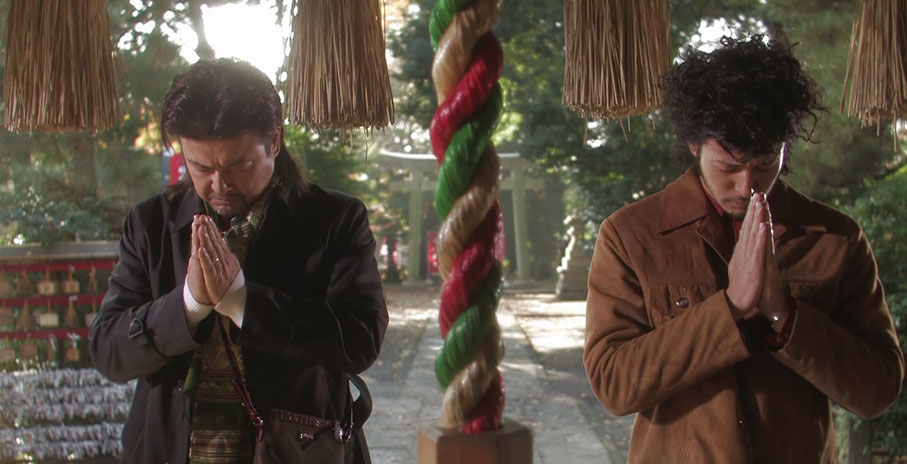
Star Joe Odagiri Interview (11:51)
In a similarly styled interview to the above (complete with many of the same questions), lead actor Joe Odagiri recalls his initial reaction to the script, and shares his thoughts on his character, the evolution of his hairstyle (director Miki told him to imagine a young Bob Dylan), his fellow actors, and the relationship between the characters of Fumiya and Aiichiro.
Stage Greetings (10:59)
As an introduction to an unspecified screening of the film, director Miki and his four lead actors are invited on stage to say a little about it, as well as asking each other questions, which are usually delivered by the host. Miura Tomokazu misses no opportunity to take the piss out of Joe Odagiri's colourful attire.
Trailer (1:44)
A very Japanese trailer, complete with cutesy graphics and the proclamation that this is a "heart-warming story of two lonely men trudging along together."
My one small above-detailed reservation aside, I remain as entranced by Adrift in Tōkyō as I was when I first saw it back in 2012. The character quirkiness works so well here because it always feels drawn from reality, the sense of the surreal coming less from the individual encounters than the notion that they would all occur to these two travellers in such a short space of time. It's a lovely little film, very nicely presented on this Blu-ray, and backed with a solid collection of standard definition special features. Warmly recommended.
The Japanese convention of surname first has been used for all Japanese names in this review, with the exception of Joe Odagiri, who is credited as this semi-westernised version of his Japanese name, Odagiri Jō.
This review is an updated version of the one for the original DVD release.
|